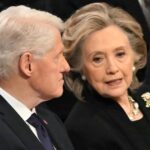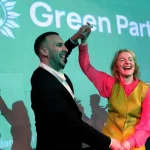
“Our omnipotent person, who art in Heaven, hallowed by xhy name / Xhy kingdom come, xhy will be done, as Earth as it is Heaven.”
Sounds ridiculous, right? Perhaps even blasphemous.
However, if certain elements within the Church of England have their way, that’s more or less what the Lord’s prayer might look like a few years down the road.
On Wednesday, Reuters reported that the “Church of England will look into the use of gender neutral terms to refer to God in prayers, but the centuries-old institution said on Wednesday there were no plans to abolish current services.”
“The issue reflects growing global awareness about the assumed usage of pronouns causing offense or upset to those who do not identify with the gender they were assigned at birth.”
Well, this is what happens when you found an entire branch of quasi-Protestant faith to obtain an expedient divorce for Henry VIII.
Sure, it takes a few centuries for God to become gender-queer — but given that the Church of England has essentially been undergirded by an ethos that closely resembles that of Unitarian Universalism while maintaining a patina of Roman Catholic high-church services in order to foster some semblance of real religiosity, this was bound to happen sooner or later.
“Christians have recognized since ancient times that God is neither male nor female,” said a spokesman for the Church of England. “Yet the variety of ways of addressing and describing God found in scripture has not always been reflected in our worship.”
However, he added there were “absolutely no plans to abolish or substantially revise” current services — and that, indeed, those changes would require “extensive legislation.”
Is the Church of England making the right decision here?
Yes: 0% (0 Votes)
No: 0% (0 Votes)
However, Bishop Michael Ipgrave — who’s the vice chairman of the liturgical commission for the Church of England — said the body had been “exploring the use of gendered language in relation to God for several years.”
“The deliberation is the latest attempt by the Church, central to one of the world’s oldest Christian institutions, to keep up with rapidly evolving notions around gender and sexuality in recent decades,” Reuters reported.
As for keeping up with the Bible — the document one would hope the state-sponsored absurdity that is the Church of England would be double-checking with — that apparently hasn’t happened anytime recently, given the apparent willingness of church officials to throw the traditional understanding of God’s manifestation under a double-decker bus outside of St. Paul’s Cathedral in London.
Mind you, there is hope; the Church of England indicated last month it wasn’t going to allow same-sex couples to be married in church ceremonies. However, it’s yet another manifestation of why the church’s adherents — and self-described Christians in general — have been declining precipitously over the past few decades.
To quote a report from the U.K.’s Religion Media Centre: “In the 2011 Census, 33.2 million people identified themselves as Christians. The number declined from 71.7 % in 2001, to 59.3% in 2011. Knowsley was the local authority with the highest proportion of people reporting to be Christians at 80.9 per cent.”
Of course, there’s also a bit of debate within the church itself, with some factions following liberal interpretations of the Bible while others insist that the Good Book doesn’t conveniently say exactly what you need it to say at that very moment.
“The established state Church in England, the C of E is the largest denomination with about 1.11 million regularly worship at its 16,000 churches, although these numbers have been falling steadily for years,” the Religion Media Centre noted.
“Anglicans are very diverse, with significant differences in belief and practice between the different wings of the Church. The three main groupings are Anglo-Catholics, evangelicals and liberals.
“Anglo-Catholics are so called because they combine Anglicanism with more Roman Catholic traditions and style. They prefer more formal services, with choral music and organs, clergy in robes, incense and bells. They have both liberal and more conservative/traditionalist factions,” the article continued.
“Evangelicals they tend to have a ‘lo’” style of worship, which prioritizes informality. They often sing modern songs rather than traditional hymns, their priests sometimes do not wear dog collars, let alone robes, and they aim to make their services accessible to people who may not normally come to church.
“Liberals/the broad church – this group tends to have a middle-of-the-road worship style, which is neither very fussy nor very informal but happy to bring together elements from any tradition. Liberals believe that faith is renewed by new insights and interaction with contemporary society and are often in the vanguard of progressive change within the church.”
You can probably venture a guess as to who is backing this change.
Of course, this trajectory toward watering down — if not entirely eliminating — the basic tenets of the Christian faith on the British Isles is nothing new. More than any other country in the Anglosphere, England’s long, slow descent into Godlessness began centuries ago. Matthew Arnold’s poem “Dover Beach,” first published in 1867, is seen as a watershed moment in documenting Albion’s receding faith, and in the most unsparing of terms. Indulge me for a moment, if you will:
The Sea of Faith
Was once, too, at the full, and round earth’s shore
Lay like the folds of a bright girdle furled.
But now I only hear
Its melancholy, long, withdrawing roar,
Retreating, to the breath
Of the night-wind, down the vast edges drear
And naked shingles of the world.
Ah, love, let us be true
To one another! for the world, which seems
To lie before us like a land of dreams,
So various, so beautiful, so new,
Hath really neither joy, nor love, nor light,
Nor certitude, nor peace, nor help for pain;
And we are here as on a darkling plain
Swept with confused alarms of struggle and flight,
Where ignorant armies clash by night.
And now, those ignorant armies clash over whether God is real at all or whether “assumed usage of [God’s] pronouns [is] causing offense.” Wonderful.
My assumption is that Mr. Arnold, not known as a figure of much joviality, wouldn’t be able to keep a straight face at this absurdity. The fact that many within the Church of England can is a sign the nationally subsidized faith has become, now more than ever, a ludicrous imitation of Christianity for those who can’t kick the habit of ritual but don’t like the moral strictures that undergird those rules.
Another Britisher of note, the considerably more religious Sir Roger Scruton, once said that “one motive underlying the atheist culture of our times” is “the desire to escape from the eye of judgment … You escape from the eye of judgment by wiping away the face.”
And what better way to do that than to cease to acknowledge God is a “He/Him”?
Make no mistake: The mere fact the Church of England even gave desultory thought to representing God as an androgyne is an unmistakable sign they’re busy wiping away that face — slowly, but surely — until there’s nothing left.






